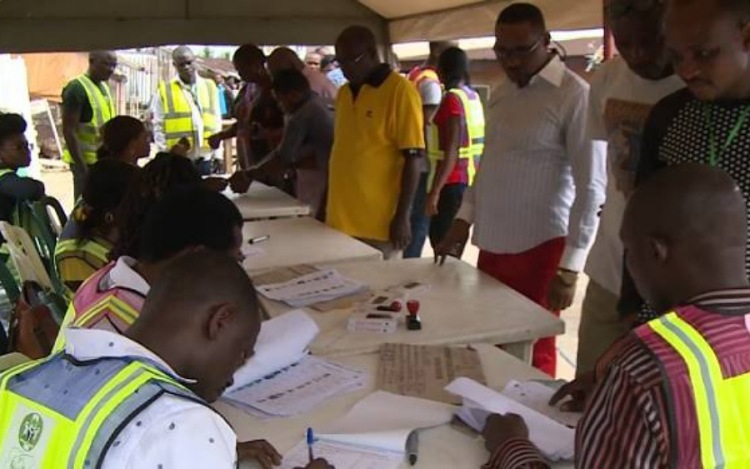
The proposition, for the umpteenth time, by the Chairman of the Independent National Electoral Commission (INEC), Prof Mahmood Yakubu, his predecessor, Prof. Attahiru Jega, and the Inter-Party Advisory Council (IPAC) last Thursday for the establishment of a national electoral offences commission to tackle impunity in the nation’s electoral process, deserves urgent attention.
They said INEC must work with relevant stakeholders to develop guidelines for reporting, tracking and documenting electoral offences.
Speaking in Abuja during a roundtable discussion with the theme, “Electoral Offenses in Nigeria, Ensuring Documentation and Effective Prosecution”, organised by The Electoral Hub, the trio stressed the need for clarity to summarise the power to investigate and the power to prosecute electoral offenders. They noted that it would help to separate the criminal elements from the civil ones in terms of the electoral process.
INEC chairman, Prof Yakubu, said, “INEC has recommended that power should be provided and that there should be an Electoral Offences Commission that should be saddled with that responsibility so that INEC can focus on its core mandate of conducting election, and facing post-election assignments.”
He argued that by virtue of the Electoral Act, INEC is empowered to prosecute electoral offenders, which it is doing within the capacity that it has over the years.
Yakubu said the position of INEC had been that the enormity of the assignment regarding the prosecution of electoral offences is such that is beyond his capacity because the law empowers INEC to prosecute but the law does not give it the power to arrest and investigate.
According to him, the commission has recommended that that power should be provided and that there should be a body that should be saddled with that responsibility so that INEC can focus on its core mandate of conducting election and facing post-election assignments.
“There is a bill now pending before the National Assembly for the establishment of that body it is INEC and other stakeholders in the electoral process that thought it wise that there would be more prosecution of electoral offenders there would be an improvement and effective prosecution if that body is established,” Yakubu who was represented by chairman, Litigation and Prosecution Department, Alhassan Umar, stated.
On his part, Jega said the establishment of a body to look into issues relating to electoral malpractices will end impunity in the electoral process.
According to the former INEC boss, “If Electoral Offences Commission is established to focus on specific objectives like the Independent Corrupt Practices and Other Related Offences Commission (ICPC) and the Economic and Financial Crimes Commission (EFCC) it will address the issues of impunity that is undermining electoral integrity in the county.
“If you can have an Electoral Offences Commission that can focus in terms of addressing the issues like ICPC or EFCC that have investigative and prosecutorial power, it should be able to address that issue of impunity, which undermines electronic integrity,” he added.
Jega urged stakeholders to key into the idea of establishing an electoral offences commission because of the intrinsic value of the work that they will do in terms of upscaling the integrity of the electoral process. He said it was possible to conceptualise a compact agency with defined responsibilities and also recruit the right kind of staff to mount it just to focus on electron offenses.
Earlier in her remarks, director, Electoral Hub, Princess Hamman-Obels, who regretted that documenting and prosecuting electoral offences had been poor over the years, said INEC has been tasked with enormous responsibilities, including conducting elections, registering political parties, conducting voter registration, and conducting civic and voter education.
She maintained that enormous responsibilities have been compounded because INEC lacks investigative powers and has to rely on a third party, the police, to investigate offences.
“This is worsened by peculiar features of Nigeria, where electoral politics is a zero-sum game and a do-or-die affair. There is an abuse of state resources, practice of godfatherism within many political parties, and high level of electoral impunity. Electoral fraud and malpractices are rooted in the zero-sum/”do or die” politics of Nigerian politicians and political parties. Politicians commit electoral offences recklessly and with impunity because they believe and know they can do these without repercussions”, she said.
It is instructive that this is not the first time Prof Yakubu and other stakeholders in Nigeria’s electoral system would be advocating an electoral offences commission but all to no avail. It is apparent that the executive arm of government and the National Assembly are indifferent to the establishment of an electoral commission for the simple reason that as major players in the political turf, they are culpable either as accomplices or sponsors of much of the violence including killings that occur during elections across the country.Consequently, we urge the executive and legislative arms of government to heed the call by accelerating the process for the passage of the bill for the establishment of the electoral offences commission without much ado. Members of these arms of are certainly no more patriotic than advocates for the commission. The propriety of an electoral offences commission is hinged on the fact that it is impossible for INEC to effectively combine its statutory functions with that of prosecuting electoral offenders. The establishment of agency is, therefore, inevitable if Nigeria desires an INEC that can conduct free, fair and acceptable elections.
